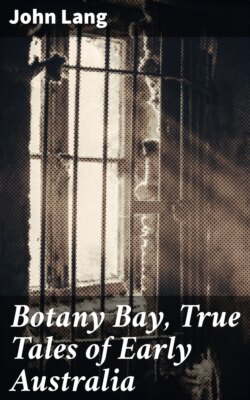Читать книгу Botany Bay, True Tales of Early Australia - Lang John - Страница 11
На сайте Литреса книга снята с продажи.
CHAPTER VIII.
ОглавлениеTable of Contents
A coroner's inquest was held on the remains found in the pond, and a verdict of "Wilful Murder" was returned against Edward Smith. The jury also found that the remains were those of John Fisher, albeit they were so frightfully decomposed that personal identification was out of all question.
The vessel in which Fisher was reported to have left Sydney happened to be in the harbour. The captain and officers were interrogated, and in reply to the question,--"Did a man named John Fisher go home in your vessel?" the reply was "Yes, and on the Custom House officers coming on board, as usual, to look at the passengers and search the ship to see that no convicts were attempting to make their escape, he produced his parchment certificate of freedom, in which there was a description of his person."
"And did the man answer exactly to that description?"
"Yes, making allowance for his years, on looking at the date of the certificate. If he had not, he would have been detained, as many convicts have been."
"And during the voyage did he talk of himself?"
"Frequently. He said that he was a farmer near Penrith; that after he had served his time he went to work, earned some money, rented a farm, then bought it, and by industry and perseverance had made a fortune."
"Did he ever mention a Mr. Smith--a friend of his?"
"Often. He said he had left everything in Mr. Smith's hands, and that he did not like to sell his property till he saw how he should like England after so long an absence. He further said that if he did not come back to the colony he would have all his property sold off, and join some trading firm in his own country."
The solicitor who had prepared the power of attorney, and witnessed it, said that a person representing himself as John Fisher, of Ruskdale, in the district of Penrith, came to them and gave instructions for the deed; and after it was duly executed, took it away with him and requested that a copy might be made and kept in their office, which was done accordingly. In payment of the bill, twenty dollars (£5 currency), he gave a cheque on the bank of New South Wales, which was cashed on presentation; that the man who so represented himself as John Fisher was a man of about forty-six or forty-eight years of age, about five feet eight inches in height, and rather stout; had light blue eyes, sandy hair, and whiskers partially gray, a low but intelligent forehead, and a rather reddish nose.
This description answered exactly that of Mr. Fisher at the time of his departure from the colony.
The cashier of the bank showed the cheque for twenty dollars. Mr. Fisher had an account there, and drew out his balance, £200--not in person, but by a cheque--two days previous to his alleged departure. He had written several letters to the bank, and on comparing those letters with the letter Mr. Smith said he had received from England, they corresponded exactly.
Opinion was very much divided in the colony with respect to Mr. Smith's guilt. Numbers of persons who knew the man, and had dealings with him, thought him incapable of committing such a crime--or any heinous offence, in fact. The records were looked into, to ascertain of what offence he had been convicted originally. It was for embezzling the sum of twenty--two shillings and fourpence, which had been entrusted to him when he was an apprentice for his master, who was a market gardener, seedsman and florist. As for the story about the ghost, very, very few put any trust in it. Bulwer was then a very young gentleman, and had never dreamt of writing about Eugene Aram; nor had Thomas Hood contemplated his exquisite little poem on the same subject. Nor had the murder of the Red Barn been brought to light through the agency of a dream. The only instances of ghosts coming to give evidence of murder were those of Banquo and Hamlet's father--and Shakespeare was not considered an authority to be relied upon in such a case as that of Fisher.
Smith's house and premises, as well as those of Fisher, were searched in the hope of finding apparel, or some garment stained with blood, but in vain. Nor did the inspection of Smith's letters and papers disclose aught that strengthened the case against him. On the contrary, his accounts touching Fisher's property were kept entirely distinct from his own, and in memorandum books were found entries of the following description:--
Sept. 9.--Wrote to Fisher to say P. has paid the interest on his mortgage.
Sept. 27.--Received £27 10s.--from Wilson for year's rent of Fisher's house in Castlereagh Street.
Nov. 12.--Paid Baxter £3 12s.--due to him by Fisher for bullock chains.
No case had ever before created, and probably never will again create, so great a sensation. Very many were firmly impressed with the belief that Weir was the murderer of the man who wore Fisher's clothes, crediting Smith's assertion or suggestion that he had given them away. Many others were of the opinion that the remains were those of Fisher, and the man who murdered him had robbed him of his certificate of freedom, as well as of the cash and papers he had about him, and then, representing Fisher, had got out of the colony and made Smith a dupe.
